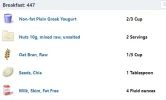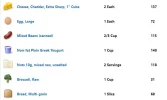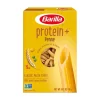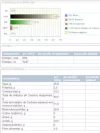Ok, I am nothing if not stubborn. But after four doctors, two physical therapists, and several fitness-freak friends have told me I need more protein, I am ready to comply. The consensus seems to be that I should have at least 60 g of protein, a day — YIKES — I am sure my “normal” intake is way less than half that.
I can’t get my act together to “count” the grams I eat every day, so I’m looking for a couple of daily go-to options that I can just easily incorporate into my diet. Any strategies or tips will be helpful.
For starters, I have seen that Greek yoghurt has about 17-18 g per 3/4 cup, so I will try for a cup a day to get about 20 grams. Protein bars are another obvious addition, but so many of them seem to be either tasteless or overly chocolatey and sweet. Canned tuna seems to be a good source, but too much of that and you’ll get mercury poisoning. Any other ideas?
I have tasted a few protein shakes and frankly am not a fan. I know they can be “improved” with the addition of fruit and other things, but that is more hassle than my limited attention span can tolerate.
One person suggested that I try to get 45-50 g every day with a few staples (like Greek yoghurt and protein bars), and that I then make sure to have fish, eggs, or chicken at least 3 times a week for the main meal. This will be a big change, because salads and pasta (like pesto or puttanesca) tend to be the kind of thing I eat for dinner.
I had a hamstring injury on the Salvador/Primitivo last fall, still not healed, but I am hoping that I can get my muscles strong enough to take up the slack for the partially torn hamstring if that makes sense. Lots of glute exercises, eccentric exercises, core exercises, but I have not made much progress on the protein.
If I were not so hard-headedly determined to get back to the camino, I might just sink into my 70s and forget about it, so I am very grateful to have this source of inspiration!
I can’t get my act together to “count” the grams I eat every day, so I’m looking for a couple of daily go-to options that I can just easily incorporate into my diet. Any strategies or tips will be helpful.
For starters, I have seen that Greek yoghurt has about 17-18 g per 3/4 cup, so I will try for a cup a day to get about 20 grams. Protein bars are another obvious addition, but so many of them seem to be either tasteless or overly chocolatey and sweet. Canned tuna seems to be a good source, but too much of that and you’ll get mercury poisoning. Any other ideas?
I have tasted a few protein shakes and frankly am not a fan. I know they can be “improved” with the addition of fruit and other things, but that is more hassle than my limited attention span can tolerate.
One person suggested that I try to get 45-50 g every day with a few staples (like Greek yoghurt and protein bars), and that I then make sure to have fish, eggs, or chicken at least 3 times a week for the main meal. This will be a big change, because salads and pasta (like pesto or puttanesca) tend to be the kind of thing I eat for dinner.
I had a hamstring injury on the Salvador/Primitivo last fall, still not healed, but I am hoping that I can get my muscles strong enough to take up the slack for the partially torn hamstring if that makes sense. Lots of glute exercises, eccentric exercises, core exercises, but I have not made much progress on the protein.
If I were not so hard-headedly determined to get back to the camino, I might just sink into my 70s and forget about it, so I am very grateful to have this source of inspiration!































